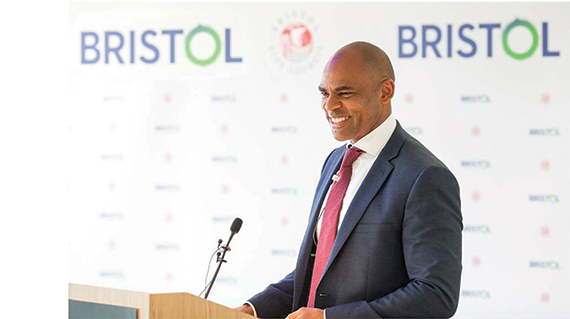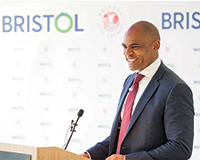 The red tide has overwhelmed the red trousers in Bristol following Labour’s Marvin Rees ousting independent elected mayor George Ferguson in the elections on 5 May.
The red tide has overwhelmed the red trousers in Bristol following Labour’s Marvin Rees ousting independent elected mayor George Ferguson in the elections on 5 May.
Property figures rather liked the perennially red-trousered Ferguson for raising the city’s profile, while Rees is something of an unknown quantity. His surprise election also complicates the fraught negotiations over the government’s devolution proposal for the west of England – Bristol, Bath and North East Somerset, North Somerset and South Gloucestershire councils.
On a map, this looks to be a cohesive conurbation, but the other three councils, all Conservative run, fear domination by Bristol and have bad memories of the four being yoked together in the unpopular former Avon County Council.
Rees’s manifesto referred – without elaborating – to strengthening the devolution deal. When answering questions recently on a local website, he called it “potentially very exciting news”, but then added: “I am concerned that the chancellor wants to impose a metro mayor on the region.” Since that is exactly what chancellor George Osborne intends, an interesting clash may arise.
There was already some dissent. North Somerset leader Nigel Ashton says his council has “voted previously to reject an arrangement that requires the appointment of a directly elected mayor and they will now need to consider whether there is enough in the deal proposal to take a different view.” Meanwhile, Bath and South Gloucestershire were mildly better disposed.
This is not just local jealousy, says Edward Nash, senior partner in built environment consultancy Nash Partnership. “Bristol is a mercantile and port city that is little related to its hinterland and that is part of the problem. That failure has caused a lot of the political difficulties we see,” he says. If these antagonisms can be resolved, the devolution deal looks tempting to those working in Bristol’s property market.
Tim Davies, head of the Bristol office of Colliers International, says: “I think a collaborative approach is the way ahead despite the four areas being disparate, as the devolution deal will mean there is a war chest to draw on.”
Jo Davis, regional senior director at Bilfinger GVA, thinks the area covered could be larger, but says there is a good argument that “our natural economic area is out to the M4”. He adds: “I wish I was sure the other three councils will back it. If not, it may mean central government has to put in more money.”
That may be the point. The councils know the government wants some devolution deals to show off, and they may secure more money by being awkward.
Tim Davis, head of Cushman & Wakefield in Bristol, thinks the geographical area chosen is coherent and right.
“The other three councils have got to help Bristol grow. The green belt comes right into Bristol and it is hard to think you could design a worse system.
“Bristol does not have the land. Avonmouth offers a decent amount of sites but it’s in South Gloucestershire, and North Somerset comes right up to Bristol City’s football ground. Devolution may mean the duty to co-operate works better.”
That might help solve Bristol’s pressing need for homes, says Simon Prescott, a partner at Barton Willmore.
“The devolution deal offers £1bn drip-fed over years, but we can borrow against that straightaway. The critical thing is that there is quite a lot of cash,” he says. “The priorities have got to be housing and transport, which cannot be solved by any one council on its own.”
Craig O’Brien, head of planning at Savills’ Bristol office, agrees. He says: “If you talk to the other local authorities about solving Bristol’s land problems, it is liable to be a very short conversation, so devolution and a metro mayor should make that work better.
“Bristol is not too bad on employment land but it cannot accommodate its housing within its boundaries and it needs better infrastructure.”
A joint spatial plan proposes 85,000 new homes over 20 years, but Barton Willmore research suggests that 153,000 are needed to meet the area’s economic potential.
There is plenty to gain but also numerous obstacles to the devolution package, of which the most unpredictable is the political change in Bristol.
The West of England devolution proposal comprises:
- An elected metro mayor to oversee delivery of the package
- £30m a year for 30 years from the government for infrastructure
- Devolution of transport budgets, and powers over buses and key roads
- Powers to accelerate housebuilding
- Support for growth of the Bristol & Bath Science Park, and Food Enterprise Zone
Bristol’s new mayor: Marvin Rees
It was the surprise of the night in the local elections in Bristol on 5 May when Labour MP Marvin Rees ousted independent incumbent George Ferguson after the contest was taken to a second ballot.
Rees, a 43-year-old married father of three, won after a second ballot was triggered following the first’s failure to return a candidate with a majority of more than 50% over the nearest rival.
Rees first stood for mayor in 2012, but was beaten by Ferguson. This time round, Rees gave up his job as a public health manager to run for mayor.
Housing, deprivation and inequality issues are key priorities that Rees will tackle in his new role, along with an ambitious pledge to deliver 2,000 new homes, 800 of which will be affordable.
Paul Butterworth, partner and head of social housing at TLT, says: “This is a laudable ambition and one that will resonate with many across cities in the UK where there is an acute shortage of housing.”
However, he wonders if all this is actually deliverable. “There are a number of key aspects which may get in the way. One is the price of land, meaning that delivering viable schemes with the level of affordable needed is a barrier. Another is the delays in dealing with planning applications, which hampers delivery. And then there are the negotiations between landowners, developers and affordable housing providers in which all conspire against meeting housing demand.”
One of the ways in which Rees could deliver more housing is to look at the council’s own land and how to use it effectively. Butterworth says: “The council could see what capacity there may be to bring forward much-needed housing by using its own resources for sale and development or alternatively for development itself.”
Bristol’s new mayor – property market view
“Like him or not, George Ferguson did much to raise the profile of Bristol both in this country and internationally. I hope the new mayor continues in the same vein.”
Tim Davies, Colliers International
“Marvin Rees will bring a very different style of leadership and I’m confident will continue to successfully promote Bristol. But we cannot underestimate the challenge Bristol faces, with all UK core cities now competing for the same investment and occupiers.”
Jo Davis, Bilfinger GVA
“I sincerely hope Mr Rees does not get embroiled in the type of party politics and short-termism that historically has held Bristol back. My concern is that the four authorities will be hampered by one or more of them showing short-term parochial attitudes.”
Tim Davis, Cushman & Wakefield
“I think his election as mayor is unlikely to calm those nervous about the growth of a greater Bristol into the rural hinterland.”
Jonathan Orton, director, Origin3











